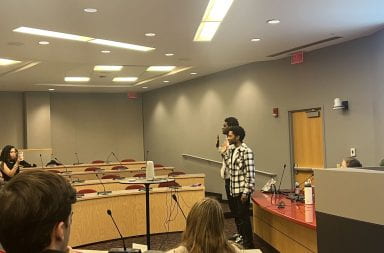Just past midnight on Sunday, thousands of Ohio State students celebrated the death of Osama bin Laden. While some jumped in Mirror Lake or set off fireworks, others were disappointed with the reactions of their classmates.
“I mean, I think it’s a good thing. That’s what our military is for, to eliminate threats and obviously, (bin Laden) was a threat, but most of those students who jumped last night were not directly involved with 9/11,” said Greg Lavins, a second-year in French and sociology. “It’s kind of sad celebrating someone’s death with beers and Facebook photos. Someone died. We killed someone.”
From a psychological perspective, the jubilation was not a surprise and could mirror OSU sports, said assistant professor of psychology Kentaro Fujita.
“With his assassination … it kind of represents, symbolically I guess, for many people a tangible sign that people are making progress,” Fujita said. “This has been the goal of the United States for some time. I think for a lot of people, given how important this goal has been for the country, their celebration represents the celebration of achieving that goal much like when the football team wins.”
Though some students were upset with the celebrations, they were not surprised.
“It was just a typical OSU celebration,” said Amanda Ross, a third-year in fashion and retail studies. “I told my boyfriend, ‘I guarantee someone jumps into Mirror Lake.'”
In addition to the impromptu swim, fireworks could be heard around campus for hours after President Barack Obama announced the news of the al-Qaida leader’s death in an address to the nation Sunday.
Even if the celebration may be understandable from a psychological viewpoint, some students struggled to find reasons for joy.
“I’m disappointed in OSU,” said Pete Metz, a fourth-year in political science. “People just don’t understand. I’m relieved, but I can’t celebrate someone’s death. This isn’t (Victory in Japan Day), there are still terrorist threats, if not more. Those students just don’t understand. It’s kind of morbid.”
The discomfort some felt can best be explained by conflicting values, Fujita said.
“With some individuals, I think they may feel uncomfortable because on the one hand, it was a successful goal accomplishment, but on the other hand, the manner in which it was carried out and the goal itself may not be one which they were happy with,” he said.
Kate Haverland, a third-year in fashion and retail studies, echoed the opinions of her fellow students.
“I wasn’t shocked that students jumped,” she said. “It was just another excuse to celebrate, but what I want to know is where students are storing fireworks in the dorms.”
The celebration of students could be related to the self-esteem and the psychological phenomenon known as basking in reflected glory, Fujita said.
“When people who are part of the same group to which you belong, when they accomplish something, we like to believe that it reflects something about us as well,” Fujita said. “There may also be a self-esteem component because we like to align ourselves with successes that people of our group have had. … We feel joy and jubilation when we accomplish our own personal goals. We do the same thing when our groups accomplish their goals.”
Metz reflected on his friends in the military and how they reacted to the news.
“They’re pleased, but it’s just another reminder that it’s not all settled,” he said. “If anything, we’re on heightened alert now. It’s a big deal.”
Some said they were excited OSU students made such a big deal out of the news.
“I think it’s cool that this matters so much to everyone and that it is on the same level as the Michigan game,” said Jessica McKean, a third-year in marketing.
Other students do not think reactions to a football game and a death should be on the same scale.
“I don’t understand. I mean, I am happy that it happened, but I’m not celebrating,” said Emma Morgan, a second-year in psychology. “I don’t think we should celebrate someone’s death.”
Though some students look at the reactions as a celebration of death, there may be other root causes, Fujita said.
“Are they celebrating because they think it is over or because they think we have reached a significant milestone?” he said. “So there may be some misunderstandings among people. Even though we are all celebrating, the reasons why we are celebrating may be very different for different people.”


